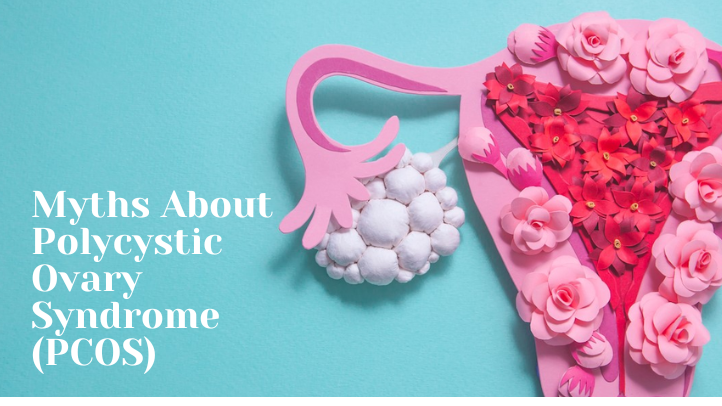Blog

Myths About Polycystic Ovary Syndrome (PCOS) – When the ovaries (the female reproductive organ that produces and releases eggs) produce hormones in extreme amounts which results in the condition of hormonal imbalance called Polycystic ovary syndrome (PCOS). In a female who has PCOS her ovaries produce unusually high levels of hormones called androgens. Androgens are a hormone that helps people to enter puberty and mature physically. When high androgen is released in a female body it may develop acne, facial hair, and other issues Which causes the reproductive hormones to become irregular. Because of this, women with PCOS often have irregular menstrual cycles and unpredictable ovulation. There are several myths about polycystic ovary syndrome that you need to discuss with your specialist and not confirm by yourself only.
Enlarged ovaries with many small follicles containing immature eggs (known as polycystic ovaries). Many raised concerns about the misdiagnosis of PCOS. They reported seeing many women who self-diagnosed based only on irregular cycles or an ultrasound that showed polycystic ovarian. on the other hand, those who have polycystic ovaries but don’t have PCOS. All women produce small quantities of androgens. However, women with PCOS produce more androgen than normal. This can impede ovulation and interfere with regular menstrual cycles. Follicles grow and accumulate fluid. However, the eggs are not released. There is no ovulation. The follicles may develop cysts. When this happens, the body may not produce progesterone which is necessary for regular menstrual cycles.
Although there’s some evidence to support the idea that polycystic ovarian syndrome (PCOS) is a genetic disorder, there are many other factors that can contribute to the start of PCOS, including obesity. 80 percent of women with PCOS have been diagnosed as clinically obese. Another risk factor is insulin resistance. Insulin resistance occurs when cells in the muscles, fats, and liver do not respond effectively to insulin and are unable to absorb glucose from the blood. This can lead to an increase in blood glucose levels as the pancreas releases more insulin to compensate.
There is also a wide variation in the severity of symptoms, and there is no dividing line between normal and abnormal.
Several other factors and conditions can mimic PCOS, such as
Since PCOS has no confirmed symptoms and causes that does not mean leaving it untreated will not create any problems. Still, it can increase your risk of
Polycystic ovary syndrome (PCOS) is one of the most common causes of fertility problems in women. However, PCOS does not mean that pregnancy is impossible. Many women who have PCOS can conceive naturally or through fertility treatments. Additionally, lifestyle changes and a healthy diet can increase the chances of conception.
Many people mistakenly think that PCOS means cysts, but that’s not the case. Many women have small follicles in their ovaries. They may look like a “string of pearls on an ultrasound,” but they’re very different. They’re not cancerous, and they don’t cause pain. Not every woman diagnosed with PCOS has follicles on her ovaries.
Polycystic ovary syndrome (PCOS) is one of the causes of irregular menstrual cycles. However, many other factors can contribute to irregular menstrual cycles.
Normally menstrual cycle lasts between 21 and 35 days. However, irregular cycles can be caused by a variety of factors such as stress, thyroid disorders or other endocrine conditions, fibroids, or extreme dieting
While some women with PCOS are unable to conceive naturally and may require fertility treatments to stimulate ovulation at the time of their choosing, many women who have PCOS conceive naturally and reach their desired number of children. Women who have PCOS and those who do not have PCOS have the same number of children.
While there is no treatment for PCOS, women who are overweight or obese can lose weight to help regulate their hormone levels. Otherwise, treatment focuses on symptom management.
It must be confirmed from the above discussion that PCOS can occur with or without showing any symptoms. For better understanding and diagnosis you need to visit a good gynaecologist. If you are from or near Chandigarh it is suggested to visit Dr Ruchi Rai Ahuja at Ahuja Clinic, situated at #109 Sector 18 A, Chandigarh.
Copyright © 2025 Dr Ahuja Clinic. All Rights Reserved | Marketing by : WebHopers
Website Design by CSW Technologies